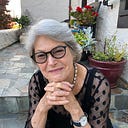In my Monday writing group this week, a friend and fellow member wrote about his years at a boutique accounting firm in San Francisco at the time of early computer assisted auditing. That small firm became a giant international one through mergers. Many of us have lived through mergers — in banking, advertising, accounting, and publishing. For those of us who have lived through them, we know that life after a merger requires flexibility. Nothing about our old company seems to remain the same in the new one. As of the accounting firm’s second merger, my friend Joe put up a sign in his office: Change is the Way Things Are. He was in his mid-30s at the time. Change as normal is even more relevant when we are 65, 75, or 85. Why? Think about what we have learned and accommodated in our lifetimes — computers, cell phones, completely different parenting styles, and fast food — to name a few.
My first “personal” computer was actually my small non-profit’s computer in the late 70s. It was huge. As I write this on my 5-year-old Mac laptop, I estimate that that computer was about two feet square, and, like the original Ford model T, all black. One of our board members had insisted that doing our accounting would be so much easier if I learned to use this computer. I think he donated it. Learning how to use it felt like brain surgery. I don’t think I was ever totally proficient in this effort, but I did learn to keep the books accurately (at least I think I did and no tax entity has come after me since then).
There have been many times when I have had to, or I have chosen to say yes to a new process, a new relationship, or a new development in my life. Remarkably, I have more choices than I have ever had. Remember I am 76. A lot of this is privilege — white privilege, financial privilege, even female privilege. I am very aware of this privilege and I know that not everyone who might read this has the same advantages.
However, what we all need — perhaps especially my contemporaries — is flexibility. And not just the kind that allows us to deal with a change in plans. As we age, we need positive flexibility because increasing amounts of our lives are out of our control. We get sick. We can’t remember passwords. Our child or our best friend dies. The airline cancels our flight, or all the flights that day. Our lives change whether we want them to or not and our ability to say yes to whatever is, is crucial.
Current research shows that older adults as a population have a more positive sense of wellbeing than our younger counterparts. We fight with our spouses less, invest in other meaningful relationships more, in short, seek social harmony rather than social control. Being right is less important than demonstrating caring. We remember our past, many of us, with rose-colored glasses. The stories of our triumphs tend to leave out the dark nights of our souls. We may still suffer slights from our children or friends, but we are less likely to make a big deal out of them. Psychologists call this positivity. It is the bias toward happiness and away from depression and anxiety. For some of us, this is the way we have always lived. For others, it is time to cultivate this worldview, to lean into flexibility and find our best selves there.
What I am saying is that at this time of great unpredictability and even chaos, we need to stay loose. We need to allow our children to help us and to be grateful for that help rather than to be embarrassed that we can no longer do a thing we did with ease before. We need to take a deep breath and not spew out our anger at someone or something we cannot control, be that someone our spouse or the doctor’s receptionist. Believe me, I’m giving this advice to myself as well as to my contemporaries.
Physically, I accept that I am not as flexible as I was. I am moving toward chair yoga and away from standing poses that require freedom of movement I no longer have. I need the same attitude toward my intellectual and emotional life. When I am able to be mentally and emotionally flexible, when I can see my life as a glass half full, I enjoy my life more completely.
